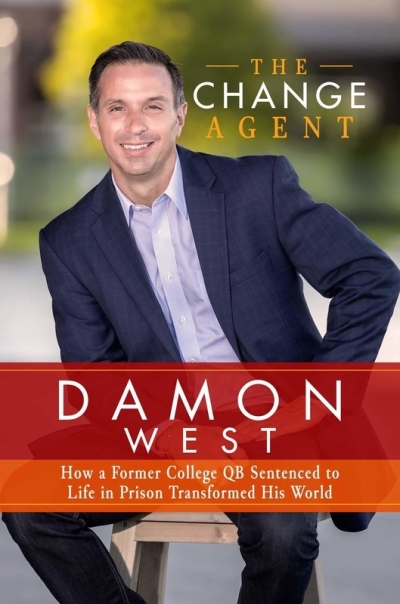College football star-turned-meth addict shares how God radically transformed his life in prison
College football star-turned-meth addict shares how God radically transformed his life in prison

On paper, Damon West had it all.
Raised in a loving Christian home in Port Arthur, Texas, West rose to fame as the star quarterback for the University of North Texas. After college, he began working in politics in Washington, D.C., and then secured a job working for one of the largest stockbrokers in Dallas.
But in secret, West told The Christian Post, he was a “complete, broken mess,” a man making “every wrong turn possible.”
Unbeknownst to many around him, West had endured childhood sexual abuse by a babysitter at the age of nine. By the age of 12, he escalated from drinking and smoking to using marijuana.
"Abuse affected me deeply; I got into adult behaviors at a young age that soon turned into serious addictions," he recalled.
When his football career prematurely ended due to a shoulder injury, West developed a dependence on prescription drugs, and eventually began dabbling in cocaine, ecstasy, pills, and “nearly every other drug in the book,” he admitted.
But it wasn’t until he was introduced to meth in 2004, West said, that he became a “full-blown drug addict.”
“Meth was a gamechanger,” he said. “Before that, I was still managing life; I was at the height of my career. Meth turned my world upside down and at that moment, I became a slave to that drug and gave everything away for it. I went from working on Wall Street to living on the streets of Dallas. I was homeless.”
To support his addiction, West began breaking into storage units and committing robberies, crimes he continued for three years: “All I could think about was my next fix,” he said. “I was a sinner, a thief, and a drunk.”
On July 30, 2008, West was arrested by a SWAT team and put in county jail, or, as he puts it, “rescued.”
"God got me out of a situation I never would’ve gotten out of myself,” he said.
Nearly a year later, he was sentenced to 65 years in prison for Engaging in Organized Criminal Activity — a moment West said was his “true rock-bottom.”
While in a Dallas jail waiting to be moved to state prison, West began asking his fellow inmates how to survive for the next several decades. “All of them told me to join a gang because these guys were all lifers. They didn’t care about making parole,” he said.
However, West’s mother, who had prayed for her son every day throughout his life, told him, “Debts in life need to be paid, and you’ve been hit with a big debt by the state of Texas. You owe your parents a debt, too.”
West’s mother told him not to join a gang or get any prison tattoos. “Come back as the man I raised or don’t come back at all,” she said.
“That was tough love,” West said, “and I promised her I wouldn’t join a gang — but I didn’t know what I’d just promised.”
But one inmate, West recalled, offered him a different perspective. An older, black man identified only as Mr. Jackson told him: “Be a coffee bean.”
“He told me, ‘Think about putting three different things in a pot of boiling water, which represents prison. Anything we put in that pot is going to be changed by heat and pressure,’” West said. “A carrot goes into prison and gets beat and robbed and raped and maybe killed. It softens and eventually falls apart. Don't be a carrot.”
When the egg goes into a pot of boiling water, it hardens up: “It’ll be fine physically, but in time it’s liquid core turns hard,” Mr. Jackson said. “If your heart becomes hard, if you’re incapable of giving love, you’ll become institutionalized. Don’t become an egg.”
But the coffee bean, Mr. Jackson stressed, changes the environment around it for the better. It creates coffee.
“If you’re going to survive prison, you have to be like a coffee bean,” Mr. Jackson said. “Everybody in life puts out energy, and whatever you put out you get back. If you walk around with a smile, you’ll change that prison from the inside out. The other positive people will find you because of your energy.”
“That conversation was so important because it gave me hope that I had the power to affect the place I’d be,” West said.
While the first couple of months in prison were “brutal,” West said that over time, he began to see the “coffee bean” philosophy take effect. “I began to attract positive people,” he shared. “I met men volunteers that would mentor me and they taught me the secret to life: serving others and being humble. I got to know God and had a spiritual awakening. I learned how to pray and I got into recovery.”
During his time in prison, West studied criminal justice and earned his master’s degree, deciding to dedicate his life to “servant leadership.” Miraculously, he made parole seven years and three months after he began what was essentially supposed to be a life sentence.
“I did everything I could; I was a model inmate, but God opened that door,” West said. “Nobody makes parole with a life sentence. For me to make it, God had this plan the whole time.”
“God said, ‘I can use you, I’m going to put you through this process to become the best version of yourself to show the world what my power truly is. He said, 'I’m going to let you go, and you’re going to work for me. But if you ever stop working for me, this is what you’re coming back to.'”
West first shared his story in the book The Change Agent: How a Former College QB Sentenced to Life in Prison Transformed His World. In June, he released a second book, The Coffee Bean, co-authored with bestselling author Jon Gordon. The book is described as a “fable that teaches readers how to transform their environment, overcome challenges, and create positive change.”

Now married with a stepdaughter, West also shares his story of hope and redemption with schools, prisons, and churches around the world. Over the last few years, he's shared the Coffee Bean lesson with college football teams such as Clemson, Alabama, Georgia, and Texas, and countless schools and businesses.
But his favorite audience, he said, are inmates. “One of the best things I get to do is go to prisons to share my message,” he told CP. “I know what it’s like to do time in one of the toughest units in prison, so I have tremendous currency there. I’m selling the redeeming love of Jesus; I’m selling hope.”
“My worst day out here is better than my best day in prison,” he added. “I meet more people out here that are imprisoned by their thoughts. I want people to know that if God can redeem me, a meth-head, alcoholic, thief, He can redeem anyone.”





























